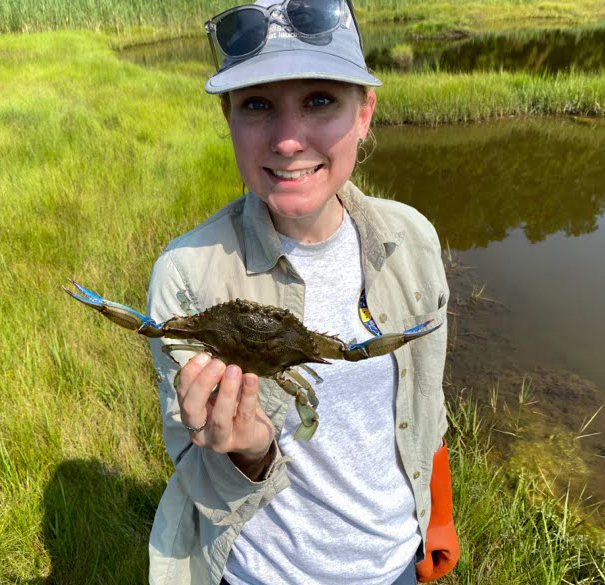
Wells Reserve Research Associate Laura Crane holds up a blue crab. Blue crabs are appearing in increasing numbers on the coast of Maine, and their potential impact is the focus of ongoing research. (Photo courtesy Coastal Rivers Conservation Trust)
Coastal Rivers Conservation Trust will host a workshop on the implications of increasing populations of blue crabs on the coast of Maine from 4-5:30 p.m. on Wednesday, Feb. 28 at the Denny Conservation and Education Center in Damariscotta.
Blue crabs have long been a highly sought-after shellfish on the east coast of the U.S. and in the Gulf of Mexico, and they are the most valuable fishery in the Chesapeake Bay. Until recently, this species was rarely found north of Cape Cod.
As the Gulf of Maine warms, however, the range of this warm-water species has been expanding northward. Over the past few years, blue crabs have been observed in Maine waterways in increasing numbers, as reported by researchers, harvesters, and beachgoers alike.
This raises important questions for coastal communities. Are blue crabs here to stay? Where are they appearing along the Maine coast? What effects could they have on local ecosystems and existing fisheries?
Laura Crane, research associate at the Wells National Estuarine Research Reserve, in Wells, and Jessie Batchelder, project manager for the fisheries team at Manomet, will address these questions and discuss how the Wells Reserve and Manomet are working with other researchers and the broader community to document the range expansion of blue crabs in Maine’s coastal waterways and to better understand the implications for Maine.
This program is free of charge, thanks to member support. There are options to participate online as well as in person. Registration is required. To register, go to coastalrivers.org/events.
Crane is involved in a variety of projects aimed at understanding how climate change is impacting coastal ecosystems, from water quality to larval fish to salt marshes. In particular, Crane is interested in monitoring the spread and impacts of invasive and range-expanding species arriving in the Gulf of Maine.
Over the past few years, Crane has been leading trapping surveys in Wells to monitor the range expansion of blue crabs into southern Maine estuaries and to better understand the impacts they may have on local ecosystems.
Batchelder’s work focuses on strengthening and diversifying fisheries resources and understanding Gulf of Maine ecosystem change in the changing climate. This work is deeply rooted in collaboration with coastal communities and industry members. She has a background in shellfish aquaculture from a research and commercial farmer perspective.
Coastal Rivers is a non-profit, member-supported, nationally accredited land trust caring for the lands and waters of the Damariscotta-Pemaquid Region by conserving special places, protecting water quality, creating trails and public access, and deepening connections to nature through education programs.
For more information, email info@coastalrivers.org or go to coastalrivers.org.



